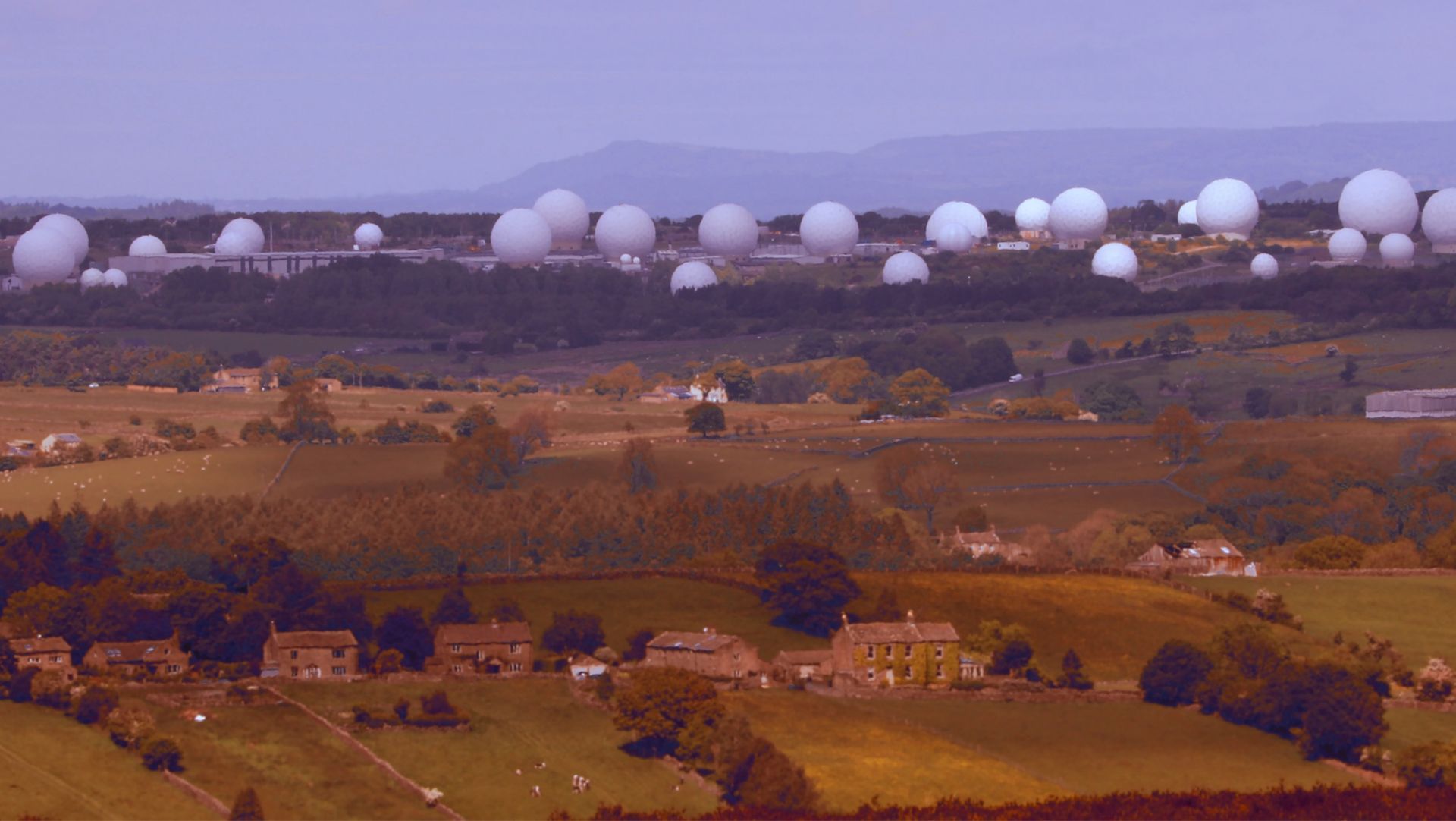
Andrew Black ©Erika Stevens
Andrew Black: "I would like to be able to make films that open up a conversation, or bring pre-existing conversations into unusual contexts, or that maybe make audacious connections between things."
Andrew Black's Margaret Tait Award commission "On Clogger Lane" premiered Feb. 21 at Glasgow Film Theatre. For those unable to attend the premiere, an exhibition of Andrew Black's work, including this film, will be on view at The Tetley, Leeds, from January 20 to May 14, 2023.
On Clogger Lane explores how the infrastructures of capital have transformed the topography and social relations of a rural valley in the north of England over generations. The film meanders through a landscape dominated by a satellite monitoring station, flooded by reservoirs, riddled with mines and quarries, and haunted by the traces of previous inhabitants. On Clogger Lane features conversations along with archival footage and film music to explore the points of contact between passivity and protest, public and private, past and present, all converging on the same patch of old land. Launched in 2010, the Margaret Tait Award is commissioned by LUX Scotland in partnership with Glasgow Film and supported by the National Lottery through Creative Scotland. Inspired by pioneering Orcadian filmmaker and poet Margaret Tait (1918-99), the award recognizes experimental and innovative artists working with the moving image. The prize is awarded annually to a Scottish-based artist who has produced a significant body of work in the last five to ten years, is recognized by their peers for their contribution to the artistic field of the moving image, and can demonstrate that the prize will have a significant impact on the development of their practice.
Interview Directory
ART
Name: Andrew Black
Occupation: Artist, filmmaker
Statement: "I just hope I will have the opportunity to continue doing the kind of work I have been lucky to do over the past couple of years"
What do you hope your film will do for its viewers and can you also explain the title to the readers?
I wanted the film to feel like a slightly hallucinatory journey through a familiar but haunted landscape. It is about the Washburn Valley, a small area of rural Northern England near where I am originally from. Clogger Lane was an old road that ran through the mill-village of West End. Along with the church, dwellings, mill buildings, farms and graves, the lane vanished underwater in the 1960s, when the upper Washburn was dammed to create Thruscross Reservoir, the fourth large reservoir in the valley. This means that a substantial part of the old landscape is now underwater, along with its traces of human habitation and endeavour, accumulated over millennia. The title is meant to suggest a sort of meandering journey along the submerged country road, through these weird and eerie spaces in which specific traces of the past, and of the future as well, can be stirred up.
How has the landscape of the Washburn valley changed? What observations have you made? How is the region developing at all in the current political and economic situation?
One of the most striking local features is the huge military installation at Menwith Hill, a surveillance station occupied by the American National Security Agency, which gathers information from satellites, including private phone, text, email and digital communication information from ordinary people’s devices. It was established during the Cold War and is an obtrusive piece of dystopian architecture in the middle of all this quiet agricultural land. Groups of people, primarily local women, opposed the station from its early days, and have staged and sustained various acts of protest, trespass, sabotage and resistance there over decades, though the station is still expanding, and very little protest still occurs there (some does). In the film I’m trying to tie this nightmarish presence in with some of the other, historic encroachments of the forces of capital into the land and its communities, and look at some of the ways in which these have transformed both the landscape and people’s lives. All of these themes are explored in the film through anecdotes told conversationally by local people.
Despite the acts of resistance to the base, the area is today broadly conservative, and I wanted to contribute a slightly disruptive portrait of the British countryside that re-asserts that it has formerly been, and in some ways still could be, a site of unrest and struggle.
What is the current situation actually in Glasgow, where you are based? How do you see your role as a filmmaker for the region?
I’ve been in Glasgow for more than 13 years but have made most of my recent work in rural Scotland and Northern England. A few years out of art school, I joined the committee of Transmission, which is maybe a good example of the kind of anarchic, collectively-run, sometimes cliquey space that characterises how the Glasgow art scene is often thought of. A lot of activity used to, and to some extent still does, go on outside of the main funding streams and institutions, and it was quite possible for people to make work and put on shows, parties or gigs in project spaces or in their own flats for not much money. There has been a lot of crossover between the art scene and activist organising, too. But Glasgow has changed a lot in the time I have been here, and parts of town that it seemed could never gentrify have completely transformed and people have been priced out. The huge presence of artists like myself must have had a significant role in this. However, it’s happened alongside a shrinking of opportunities for artists to be self-organised and do things independently. Most artists aren’t paid much (or at all), and public funding for the arts in Scotland is being dramatically slashed. It currently seems a hopeless future for the creative sector.
All this is exacerbated because we are at the meeting point of several crises in the UK, one of which is a crisis in housing. I worked on a film in the the Highlands last year, part of which looks at how this situation is affecting communities there. As people from urban and suburban England and Scotland, attracted by a romantic idea of the place, are easily able to buy properties and land that are now completely unaffordable for locals - especially younger people - the area is losing its social spaces, and its vernacular culture, language and social identity.
But there are various histories of resilience and collectivity to be paid attention to, including resistance to external extraction from/reorganisation of communities and land - something equivalent has certainly existed in Glasgow, and could hopefully translate to the current situation. I’m interested in where this exists elsewhere as well - even in unlikely places such as conservative rural England. My recent few projects have been trying to pull at these threads a little.
Can you tell me something about your path into the world of film? What else would you like to achieve?
I studied painting at art school and then worked in kitchens whilst trying to pursue an art practice on the back-burner. I started making videos because it was a way of juxtaposing and collaging ideas relatively quickly, compared to my laborious painting practice. It was also more social - each film I’ve made is to some extent a collaboration with the people who are in it - increasingly so, as I’ve been making films that are more and more documentary-like.
The films I’ve made are very DIY, facilitated by favours, and with the help of friends and family. There are many artists in Glasgow who make moving-image work which I’m really into - it’s a good town to make videos in, as there’s a lot of skill-sharing and sharing of equipment and resources if you are connected to other people who are doing similar things.
Filmmaking can be a way of recording how things feel for certain people at certain times, but it can also be a tool for exploring or imagining other ways that things could be, and that’s what attracts me about it. I would like to be able to make films that open up a conversation, or bring pre-existing conversations into unusual contexts, or that maybe make audacious connections between things.
Andrew Black Revenge Fantasy Still ©Andrew Black
"Glasgow is quite remarkable in that there is still some semblance of this, despite the pressures and cuts facing the arts."
What does the Margaret Tait Award mean for your career?
Margaret Tait herself sustained a film practice throughout her life with very little funding or institutional support. The Award, now reframed as a Commission, is a big deal because opportunities for artists of this scale are still sadly very few and far between. Being nominated and shortlisted is a vote of confidence in your practice from your peers, so I do feel extremely grateful from that perspective. The award has meant that I was able to connect with other artists’ moving-image communities and archives, and for the first time work with editors, and so in that respect it has certainly widened my skillset and expanded a network of possible collaborators. The film has been technically finished to a higher standard than my other work.
However I wish it was more possible for more people to develop their ideas and practices in this way without the competitive aspect of the award. It would be great if there was a more stable, properly funded, better-supported ecology of creative practitioners able to work without having to bank on getting shortlisted for something, without being in direct competition with their peers for opportunities, and without the pressure to propose the type of work that they think will be deemed fundable based on current trends. These conditions do not encourage resilient, inventive and mutually-supportive creative communities. Glasgow is quite remarkable in that there is still some semblance of this, despite the pressures and cuts facing the arts.
So as far as how I see the award in relation to my own practice - I just hope I will have the opportunity to continue doing the kind of work I have been lucky to do over the past couple of years, because although by and large it pays about the same, it has been more rewarding than washing dishes!
----
Discover more about the Margaret Tait award:
luxscotland.org.uk/programme/projects/margaret-tait-commission
Andrew Black Revenge Fantasy Still ©Andrew Black
TOP STORIES
CHECK THE THINGS YOU WANT TO THROW AWAY
HA Schult's Trash People at the Circular Valley Forum in Wuppertal on 18 November 2022.
NOVEMBER 19, 2022
_____________________
THE OPERA OF THE FUTURE
Düsseldorf, capital of North Rhine-Westphalia will receive the opera house of the future.
FEBRUARY 15, 2023
_____________________
LONDON
Opening: Lightroom, London's new artist home, shows: David Hockney
DECEMBER 2, 2022
_____________________
FLORENCE
The extraordinary museums of Florence in 2023.
JANUARY 1, 2023
____________________
DÜSSELDORF
DECEMBER 11, 2022
____________________
IN BEAUTIFUL A CORUNA
New exhibition of the Marta Ortega Pérez Foundation: "Steven Meisel 1993"
.
DECEMBER 5, 2022
____________________
WORLDLEADER
How did ProWein manage to become No. 1 in contrast to other international trade fairs.
MARCH 15, 2023
____________________
INTERNATIONAL TOGETHERNESS
Azulejos, tiles from Portugal: Today's high-profile opening showed that the Hetjens Museum lives international togetherness.
MARCH 8, 2023
____________________
TRAVEL
What major events in art, culture and society are we facing?
JANUARY 21, 2023
____________________
Hollywood
____________________
DISTANT WORLDS
Dieter Nuhr's paintings now in Senegal - "A Nomad in Eternal Transit"
DECEMBER 6, 2022

Andrew Black, ‘On Clogger Lane’, 2022. Courtesy of the artist.
A Northern English valley with green rolling hills and lush trees is dotted with ruined stoned buildings and intersected by a narrow road lined by dry stone walls. 3 cars drive along the road, one black, one red, and one blue.
The foliage has hints of burnt brown, red and yellow. Looming large on the horizon are white surveillance radomes, the sky is dark grey behind these huge geodesic domes.
RELATED TALKS








